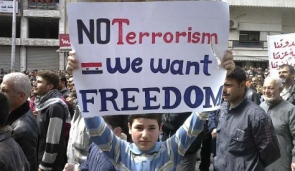 The Syrian regime is struggling to maintain control over a popular uprising that is turning into open revolt and posing a new challenge to western powers that have so far largely stayed on the sidelines.
The Syrian regime is struggling to maintain control over a popular uprising that is turning into open revolt and posing a new challenge to western powers that have so far largely stayed on the sidelines.
France on Tuesday stepped up the pressure for a UN Security Council resolution condemning a brutal crackdown that has killed an estimated 1,000 people, after Alain Juppe, the foreign minister, declared that Bashar al-Assad, the president, had lost legitimacy to govern.
The northwestern town of Jisr al-Shughour was bracing for massive retaliation after the government claimed 120 security personnel had been killed there by armed protestors.
The majority of Jisr al-Shughour’s residents are reported to have fled the town, a stronghold of the Muslim Brotherhood in the 1980s, many of them going to the Turkish border, which is just 20km away.
“The situation is evolving to the point where the state cannot control some areas, where people are armed and there is fragmentation all over,” said a Syrian political analyst.
Activists in touch with people on the ground disputed the government’s claim that armed groups in the town had shot at security forces. They said troops stationed in Jisr al-Shughour had defected to the opposition and faced reprisals from the 4th battalion, which has led the crackdown against protestors and is commanded by Maher al-Assad, the president’s brother.
Analysts and diplomats, however, also warned there have been increasing signs that protestors are fighting back and reports of weapons purchases across the border in Lebanon.
The violence in Jisr al-Shughour started after a large Friday protest, when security forces raided the town and several people were killed. A YouTube video shows a sign painted in white on the road saying: “Jisr al-Shughour does not want the army.”
“It is not a surprise that groups are retaliating – it was only a matter of time before a town decided to fight back against the regime,” said one western observer in Damascus.
Despite relentless security operations, which have left an estimated 1,000 people dead, Syria’s uprising has been spreading, with the largest demonstrations staged last Friday, but also a new pattern emerging of nightly protests in towns across the country.
In recent weeks, the most intense protests have been in areas that were historically sympathetic to the Muslim Brotherhood, including Hama, scene of the worst security crackdown in the 1980s.
Neil Sammonds, Syria researcher at Amnesty International, said the level of co-ordination among opposition activists was now “phenomenal” with unified messages coming out and unified databases for people killed and detained.
Part of the strategy appears to be calls for strikes – with Hama said to be paralysed by a general strike that started on Saturday, and other towns expected to follow.
As protestors step up their challenge to the authorities, a disparate opposition in exile has been trying to organise itself and has now nominated a team to lobby for more international pressure on the regime, which activists hope will embolden defectors.
On Tuesday a delegation of the opposition submitted evidence of alleged crimes against humanity to the prosecutor’s office of the International Criminal Court.
Although those leading elite military units belong to the same Alawite minority as the Assad family, opposition activists say that Alawite leaders should know that the population is rising against the Assad family, not the community.
The pan-Arab al-Jazeera TV channel aired footage on Tuesday of what it said was a defecting lieutenant, AbdulRazzaq Mohamed Tlas, from the town of Rastan, who said he could not continue to serve with the army after the crimes committed.
The opposition is also hoping to press world powers for more concerted pressure on the regime. The international reaction so far has been confined to unilateral sanctions against regime figures by the US and the European Union. But Russia and China have blocked a resolution condemning the regime at the UN Security Council.
“Nobody would understand if the UN Security Council stayed silent on the matter,” said Bernard Valero, French foreign ministry spokesman. “The use of violence cannot continue.”
By Roula Khalaf in London and Abigail Fielding-Smith in Beirut

Leave a Reply
You must be logged in to post a comment.